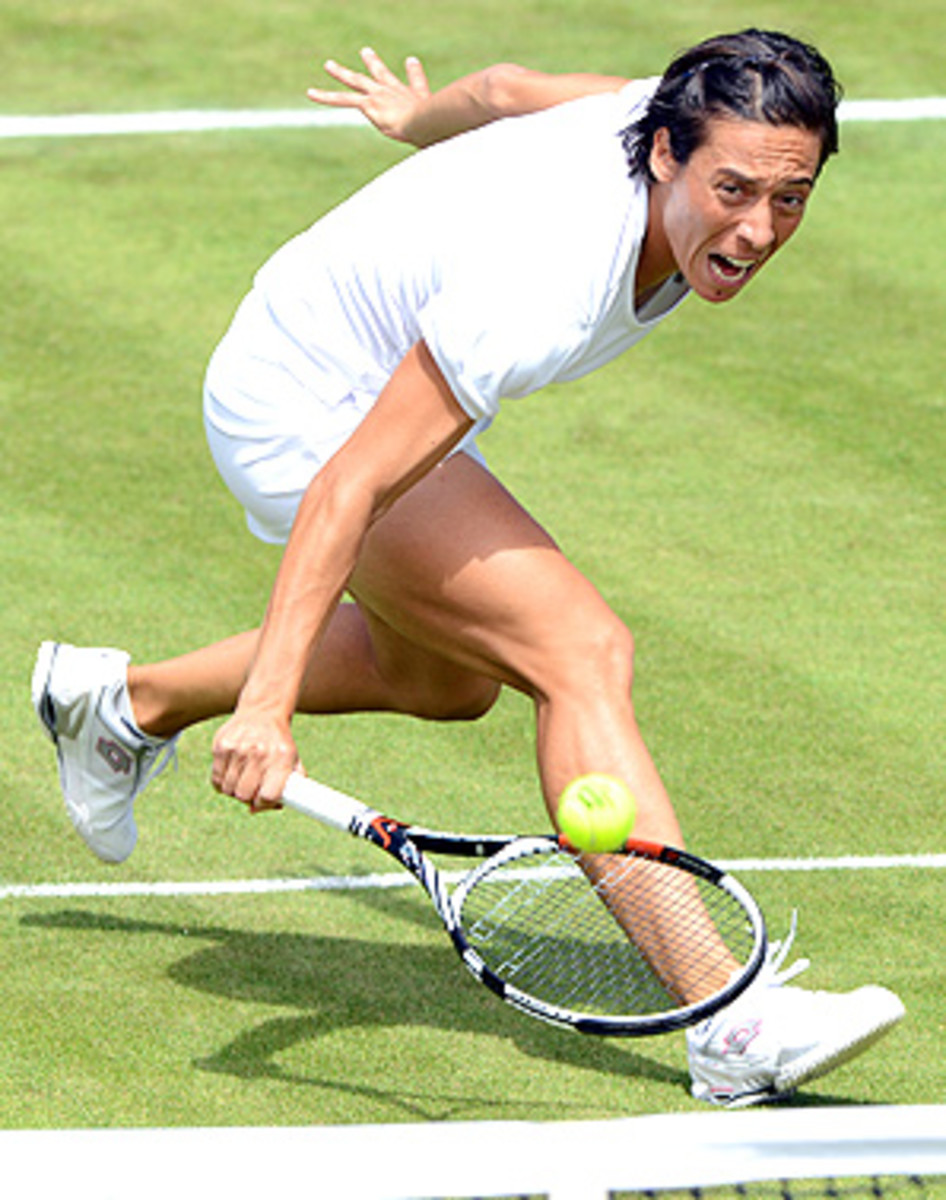Schiavone calls on guile, cunning and tactics when game isn't there


WIMBLEDON, England -- A major tennis tournament is a deep, novelistic drama, a layered panorama of plot lines and subtext. Some of these stories demand the forefront, others are tributaries flowing undetected into the mainstream.
Often these secondary narratives are the most provocative and revealing, which is where Francesca Schiavone comes in. Schiavone is a 32-year-old veteran from Milan who didn't win her first WTA title until she was 27, nearly a decade after turning pro. Her expressive brand of all-court tennis and her unpredictable blend of pace and spin make her a stylistic anomaly in an era of brawny baseliners and a cult hero among tennis aesthetes. In 2010, she won a Grand Slam almost miraculously by playing the tennis of her life over two weeks at the French Open after never having made it past the quarterfinals of a major.
Twelve months ago Schiavone was pound-for-pound the most entertaining player on the tour, raging against the metronomic banality of the women's game and peaking at No. 4 in the rankings, but her level has fallen significantly. Earlier this year, she went 10 tournaments without consecutive wins. Is there room for an unorthodox 5-foot-5½ lightweight in a sport where all of the recent Grand Slam champions are six-feet or taller (Maria Sharapova, Victoria Azarenka) or ripped like Channing Tatum (Sam Stosur, Serena Williams)?
Stylistically speaking, Schiavone is an outmoded Amadeus in a "Rock Me Amadeus" world. She's down to 26th in the world and unmistakably on the fade; however, there she was Tuesday morning, lugging her bag onto Court No. 3 to begin her 48th straight major tournament, currently the longest active streak, taking methodical practice swings and bouncing her wiry frame during the coin toss like a player half her age.
Her opponent was 18-year-old Laura Robson, the youngest player in the WTA Top 100, and a household name in the U.K. since becoming the first British girl to win the Wimbledon girls' singles title since the height of Margaret Thatcher. With wholesome, girl-next-door good looks and healthy irreverence to complement her talent, she is one of British tennis' favorite daughters and regarded as The Future. Let's just say, hypothetically, Andy Murray never wins a major: it's reasonable to predict Robson is next in line to bear the Great British Grand Slam Crucifix, with all the privileges and burdens the role affords. This was her fourth time in the Wimbledon main draw.
Schiavone may have been the favorite on seeding, but Robson is younger, bigger and stronger, and overwhelmingly had the crowd on her side. The match took place not on clay but the speedy grass that neutralizes everything that makes the Italian an extraordinary tennis player.
Robson came out smoking, overpowering Schiavone with 110-m.p.h. serves and formidable ball-striking, dictating the points with strength and maturity, like a flower in bloom. When Schiavone's game is clicking, it's a symphony of imagination and impossibility; when it's off, it's like watching a pianist attempt a Vivaldi sonata with only the black keys. Temperamental but seldom if ever to the point of self-destruction, it was easy to imagine Schiavone's fiery utterances between points getting her defaulted (if not arrested) if anyone here knew Italian.
After losing 6-2 in the first set, Schiavone did what she could do: she called for the trainer. Ostensibly for her back which, in fairness, has been a problem. (She's 32, after all, primordially old in women's tennis.) Five minutes passed. Then 10. Then 15. The gamesmanship was not unheard of, and Robson did her best to stay warm, bouncing around and taking practice swings. But when the match resumed, the teenager's momentum was derailed.
Steering her shots expertly with a gorgeous one-handed backhand that belongs in the Uffizi, Schiavone began generating balls drizzled with topspin, and she forced Robson into longer rallies, displaying a mature command of tactics and technique. While Robson was a Ferrari during her service games, Schiavone was a Fiat 500 -- taking her time, asking for her towel repeatedly, drawing it out and making the most of the negative space. ("That gave me more time to think," reflected Robson afterward, meaning it in the worst way.) When Robson vainly stabbed a forehand into the alley to give Schiavone the second set exactly one hour into the match, the Italian raised her fist determinedly toward her box. It sure didn't look like her back was hurting.
By the third set, Robson was no longer hitting through the ball as she had in the first. She began to miss by greater margins, and a foreboding look of worry began to show. The crowd was still behind her, but it was too late, as Schiavone painted the lines with her sublime variety and closed out the match, a credit to her guile, cunning and industry on a day when her best game wasn't there. Final scoreline: 2-6, 6-4, 6-4. "A little bit of experience and a little bit of personality," as Schiavone explained it, "and maybe some good shot from me."
Robson's time is near. She is dedicated to improving her movement and fitness, the physical tools are developing, and her self-belief was evident throughout a first set when she made just four errors (compared to 10 apiece in the second and third). She is a bright young talent. The day may come, if all goes to plan, when she contends for Wimbledon titles.
On Tuesday she had to settle for an education.
